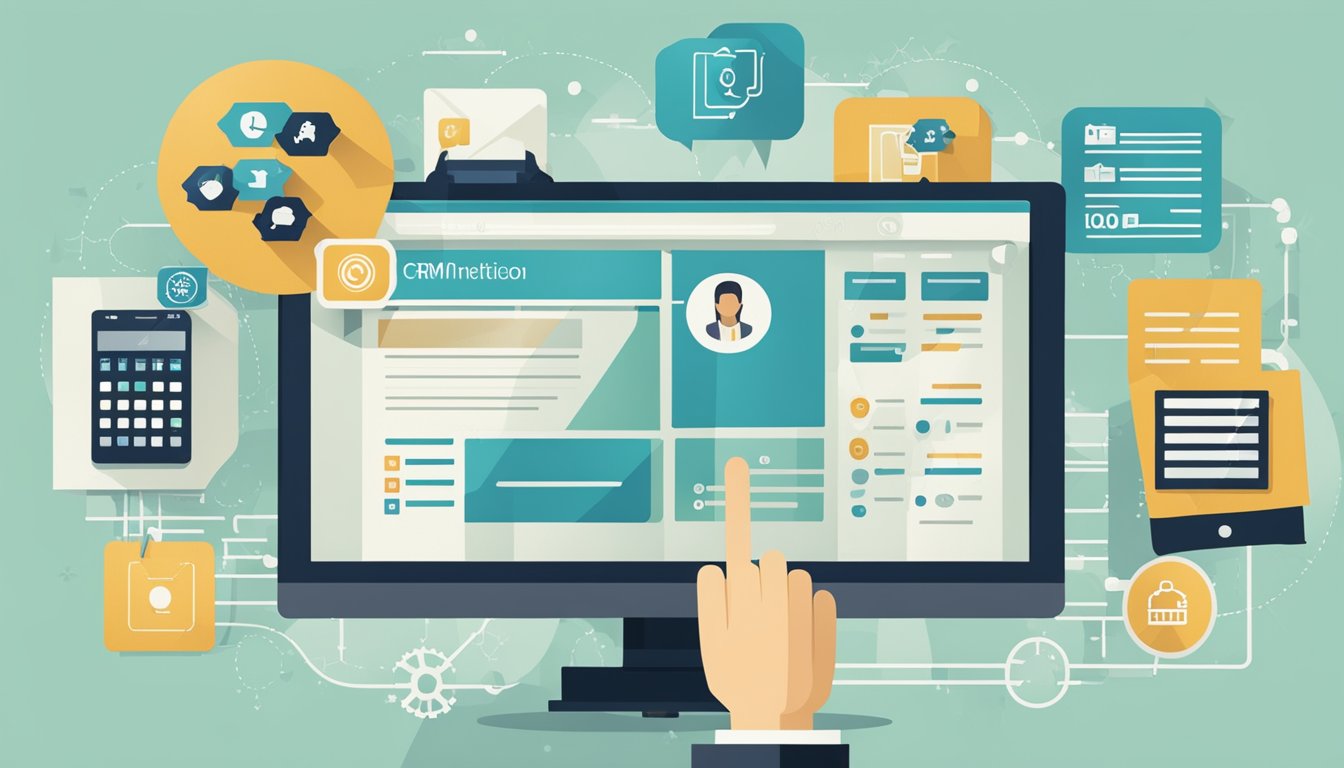
Integrate Your CRM How to Connect it with Other Business Tools
Integrating your CRM with other business tools is one of the most effective ways to streamline your workflow and improve your productivity. A CRM system is designed to help businesses manage their customer relationships, but it can be even more power
Integrating your CRM with other business tools is one of the most effective ways to streamline your workflow and improve your productivity. A CRM system is designed to help businesses manage their customer relationships, but it can be even more powerful when it's connected to other applications and software. By integrating your CRM with other tools, you can create a complete view of your customers and automate many of your daily tasks.

Understanding CRM and its importance is critical for any business that wants to stay competitive in today's market. A CRM system is a software application that helps businesses manage their customer interactions and relationships. It allows you to store customer data, track customer interactions, and analyze customer behavior. With a CRM system, you can improve your customer service, increase customer loyalty, and boost your sales.
Key Takeaways:
- Integrating your CRM with other business tools can streamline your workflow and improve your productivity.
- A CRM system is designed to help businesses manage their customer relationships, and it can be even more powerful when it's connected to other applications and software.
- Understanding CRM and its importance is critical for any business that wants to stay competitive in today's market.
Understanding CRM and Its Importance

As a business owner, I understand the importance of maintaining a positive relationship with my customers. That's why I use a customer relationship management (CRM) platform to keep track of all my business's interactions and ongoing communications with my current and potential customers.
A CRM system is a database software that allows me to manage my customer interactions, sales, and marketing efforts in one place. With a CRM, I can easily track customer information, such as contact details, purchase history, and preferences. This information helps me personalize my interactions with customers and provide better customer service.
Integrating my CRM with other business tools is crucial for gaining a comprehensive view of my customers and enhancing my operations. For example, integrating my CRM with my email marketing tool allows me to send targeted and personalized emails to my customers based on their interests and behavior. Integrating my CRM with my social media management tool allows me to track customer interactions on social media and respond to customer inquiries and complaints in a timely manner.
A CRM system is not just for sales and marketing teams. Many teams within a business may use a CRM regularly, such as customer service, finance, and operations. A CRM system can help these teams streamline their processes and improve their efficiency.
Overall, integrating my CRM with other business tools can increase efficiency, enhance data accuracy, improve customer experiences, and increase sales. There are several effective strategies for CRM integration, and the wide range of available integrations makes it easy to choose the best ones for my business.
Key Aspects of CRM Integration

Integrating your CRM with other business tools can provide a range of benefits, from increased efficiency to enhanced customer experience. Here are some key aspects to consider when integrating your CRM with other tools.
Data Synchronization
One of the primary benefits of CRM integration is the ability to synchronize data across different systems. This allows you to have a single, unified view of your customer data, which can help you make more informed decisions and provide better customer service. By integrating your CRM with other systems, you can ensure that data is automatically updated and synced across all systems, reducing the risk of errors and duplicate data.
Automation and Efficiency
Another key benefit of CRM integration is the ability to automate processes and increase efficiency. By integrating your CRM with other systems, you can automate tasks such as lead generation, email marketing, and customer support, freeing up time and resources for other tasks. This can help you streamline your workflows and improve overall productivity.
Customer Experience Enhancement
Integrating your CRM with other systems can also help you enhance the customer experience. By having a unified view of customer data, you can provide more personalized and targeted marketing, sales, and support experiences. Additionally, by automating processes and reducing manual data entry, you can provide faster and more efficient service to your customers.
Overall, integrating your CRM with other business tools can provide a range of benefits, from increased efficiency to enhanced customer experience. By considering key aspects such as data synchronization, automation, and customer experience enhancement, you can ensure that your CRM integration project is successful and delivers the desired results.
How to Integrate CRM with Other Business Tools

Integrating your CRM with other business tools can help you streamline your workflows and boost productivity. Here are three ways to integrate your CRM with other business tools:
Native Integrations and API
Many business tools offer native integrations with popular CRMs like Salesforce, Zoho, and HubSpot. These integrations allow you to connect your CRM with other tools seamlessly, without requiring any additional software or coding.
APIs (Application Programming Interfaces) are another way to integrate your CRM with other tools. APIs provide a standard way for different software applications to communicate with each other. With APIs, you can automate actions between your CRM and other tools, such as accounting software or enterprise resource planning (ERP) systems.
Third-Party Applications and Services
Third-party applications and services can also help you integrate your CRM with other tools. These applications and services typically offer pre-built integrations with popular CRMs and other business tools, making it easy to connect your systems.
For example, Zapier is a popular integration platform that offers over 3,000 integrations with different software applications. With Zapier, you can automate tasks between your CRM and other tools, such as email marketing software or project management tools.
Use of Connector Software
Another way to integrate your CRM with other tools is to use connector software, such as integration platform as a service (iPaaS) solutions. These solutions provide a library of integrations to connect your CRM with third-party applications without coding.
Connector software can be a good option if you have unique integration needs or if you want to build custom workflows between your CRM and other tools. Some popular iPaaS solutions include Dell Boomi, MuleSoft, and Jitterbit.
In conclusion, integrating your CRM with other business tools can help you automate tasks, save time, and improve your overall tech stack. Consider your options, such as native integrations, third-party applications and services, and connector software, to find the best integration strategy for your business.
Benefits and Challenges of CRM Integration

Integrating a CRM system with other business tools can provide numerous benefits, but it can also present some challenges. In this section, I will discuss the benefits of CRM integration and some potential issues that may arise, along with ways to overcome them.
Enhanced Collaboration and Single Source of Truth
Integrating your CRM system with other tools can enhance collaboration across departments and teams. By connecting different systems, you can create a single source of truth for customer data, which can help ensure data accuracy and consistency. This can be particularly useful in large organizations where different teams may be using different tools to manage customer data.
Improved Customer Service and Support
Integrating your CRM system with customer service and support tools can help improve the overall customer experience. For example, if a customer contacts your support team, having access to their entire history of interactions with your company can help your support team provide more personalized and effective assistance. This can also help reduce the time it takes to resolve customer issues, leading to increased customer satisfaction.
Potential Issues and How to Overcome Them
While there are many benefits to integrating your CRM system with other business tools, there are also some potential issues to be aware of. For example, training employees on how to use different tools can be time-consuming and expensive. Additionally, integrating different systems can sometimes lead to data silos, where different departments have access to different sets of data.
To overcome these challenges, it's important to provide comprehensive training to employees on how to use different tools. It's also important to establish clear rules and guidelines for data management to ensure data accuracy and consistency. Finally, machine learning and AI-powered tools, such as chatbots, can help automate customer interactions and reduce the workload on your support team.
In conclusion, integrating your CRM system with other business tools can provide numerous benefits, including enhanced collaboration, improved customer service and support, and a single source of truth for customer data. However, it's important to be aware of potential issues and take steps to overcome them. By doing so, you can ensure that your CRM integration is successful and provides maximum value to your organization.
Frequently Asked Questions

What are the benefits of integrating a CRM system with other business tools?
Integrating a CRM system with other business tools can provide numerous benefits, such as streamlining workflows, reducing data entry errors, and improving customer data accuracy. It can also help businesses gain a more comprehensive view of their customers, increase productivity, and improve customer satisfaction.
How can CRM integration with third-party tools improve business processes?
Integrating a CRM system with third-party tools can help businesses automate and streamline their workflows. For example, integrating a CRM system with marketing automation tools can help businesses automate lead generation and nurturing, while integrating it with accounting software can help businesses manage their finances more efficiently.
What are the top 5 CRM software options for seamless integration with other business tools?
There are many CRM software options available that offer seamless integration with other business tools, but some of the top options include Salesforce, HubSpot, Zoho CRM, Microsoft Dynamics 365, and Pipedrive.
How can CRM integration with website and social media platforms help businesses?
Integrating a CRM system with website and social media platforms can help businesses gather valuable customer data and insights, such as customer behavior, preferences, and demographics. This can help businesses personalize their marketing efforts and improve customer engagement.
What are the best practices for integrating two CRM systems?
When integrating two CRM systems, it is important to ensure that the data is accurate, consistent, and up-to-date. It is also important to establish clear communication channels between the two systems and to establish a data mapping plan to ensure that the data is properly synchronized.
What are the potential challenges of integrating a CRM system with ERP and how can they be overcome?
Integrating a CRM system with an ERP system can be challenging due to the differences in data structure and format. To overcome these challenges, it is important to establish a clear integration plan, to ensure that the data is properly mapped and synchronized, and to test the integration thoroughly before deploying it to production.




